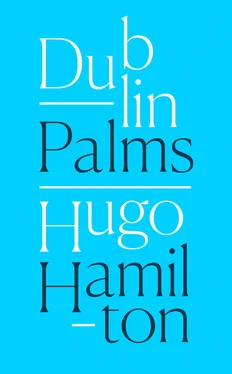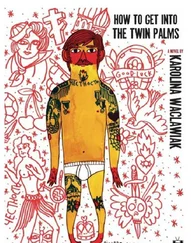The city was warm. We spent the summer in a long pause, not doing very much, going to galleries, sitting in cafés, as if we were living inside a photograph waiting to move forward. Every night I stood up in bars wearing my white shirt, singing songs in a lost language. Every morning I got out the almond oil to rub across Helen’s belly with the windows open and the tree at the centre of the courtyard swaying. Her navel was a pre-historic spiral at the top of a shining dome. We were constantly hungry. She needed tons of cheese and apples and smoked mackerel. The future was expanding inside her, it seemed she could hold it back and stop the world and never have to give birth. Our lives remained in that place of refuge before coming into being. We were in a time before knowledge. The moment before memory. All we could think of was now.
We walked through the streets at night when it was cooler. We passed by posters showing the faces of wanted German terrorists. A woman leaning out the window watched us from above in silence. The street lighting was dim. The buildings were decayed, gaps where houses went missing, the war was not far behind.
We found the viewing platform and I helped Helen up the wooden stairs. We looked across the wall at the open death zone. A stretch of empty ground lit up, guards in a watchtower, houses on the far side like canyons left in darkness. The platform had been erected in a time of handkerchiefs, for people waving to their relatives on the far side, holding up their children, calling out their names. When the people on the other side were prohibited from waving back, the platform no longer had any function other than for visitors coming to have a look over the edge of the world.
Leaning on the rail, looking at the frontier before us, I understood the shock in my mother’s eyes when she read about the Berlin Wall being built. The newspapers sent over from Germany by her sisters only confirmed how far away Ireland was, how much apart she was from her family. I grew up with that distance. The wall became part of me. Describing it was like describing myself. A human division which had spread into every corner of the world, into every family, every heart. The wall had yet to come down. The barriers had yet to be opened, people streaming across, their jubilant faces, smiling and crying, crowds on top of the wall hacking. None of this had happened yet, all that freedom was still impossible to imagine, like the sound of a new born baby.
We stared across the Berlin Wall, a kiss, a smile, the dirt of border lighting in Helen’s face as she turned to me and said – let’s go back.
Everybody in Dublin is back from somewhere. The pubs are full of returning. They talk about their encounters, drug voyages, bus journeys on death roads. They laugh at mortality. They laugh at life. They laugh at the strangeness of things, the invention of difference, the great mind-altering misunderstanding of the world.
They stand at the bar in Kehoe’s pub full of books to be written. Stories of heroic distance, cities and characters I could never dream of. One of them was robbed on a train while sleeping in the luggage rack. One of them took a piece of tubing into his nostril, his life came and went, he woke up a week later in the same place, same voices quietly talking around him, same dog lying on the ground in a curl. One of them was left between two countries, rejected at the border to Iraq, refused re-entry to Afghanistan. One of them refused to pay the price of a bottle of whiskey for a bottle of Coke and nearly died drinking the water in a river. Another one was nearly killed in a German car plant, a millisecond away from being pressed into the shape of a car door, his elbow brushed the safety button.
They have come back amazed at what women can do, what men can do, what food can do to you. An actor Helen knew from the theatre in Dublin got shot in New York by his lover, he came back in a wheelchair. A neighbour of mine got lost in Goa and never made it back to his family. A woman Helen knew at school returned from Brazil, her husband ran away with another man, the same in reverse for a man I knew from Galway, his wife went off with his sister.
One of them brought back a story from Morocco. He was in a town called Fez, a narrow street no wider than a hallway. There were three young women wearing headscarves in front of him when a donkey came rushing by with panniers full of olives and boy rider whacking a stick. The donkey was farting on the way through. The girls, the young women in their hijabs, turned around, unable to help themselves. Their hands were up to their mouths, they were in tears holding on to each other, choking, doubled over in the street.
We are back from Berlin with our story.
What have I got to tell? A Nativity scene, with the Berlin Wall in the background. I became an overnight father, we returned to Dublin, Helen breastfed Rosie in the snug, a glass of Guinness for the baby. We got a place to stay, I took up a job in the native basement, we now have a second girl, Essie, our immaculate family.
Back where?
It makes no sense.
Back to where we first met? Back to the first words she spoke to me. Back to where Helen worked in a small theatre, back to the places I brought her on the Aran Islands, she didn’t speak the ghost language, she was a visitor, I had to translate my songs for her.
Back home? Back to my country? Back to where I am from – where I am only half from, where I have tried to be from, where I have never been from?
Back to where she is not from either?
Helen grew up in England. Her family lived in Birmingham before they double emigrated to Canada and left her behind. She was sent to boarding school in Dublin, still a child. They went to live in a town with a salt mine, by one of the Great Lakes in Ontario. Helen found herself emigrating in reverse, going back to Ireland, a country she didn’t know.
She is a piece of Irish soil in her mother’s shoes.
On Sunday night, she’s on the phone to Canada. She sits by the payphone in the hallway with her back to the wall and her knees up, playing with the cable. I stand in the bedroom listening to her, the children asleep, I have their shoes in my hands, pinched up off the floor. I hear her paraphrasing her life. She describes the ground-floor flat where we live, sectioned off in the hall with two separate entrances. She says it’s fully furnished, fitted with a pastel-green carpet, nice neighbours upstairs, not far from the sea.
I can hear the questions her mother is asking in Canada by answers Helen gives in Ireland. Everything is enhanced in her voice. Our lives are magnified out of proportion by distance. She converts everything around me into a fabrication. She puts the world into my mouth.
The school, the streets, the people upstairs are very funny, the Alsatian next door is enormous, the shopkeeper is always giving her the wrong change. The furniture auctions next door, the swivel-mirror she bought, the auctioneer took her name, a sticker attached – Helen Boyce.
Our surroundings are enlarged to fit the wider spaces of Ontario. Things that remain locally reduced in my head are brought to life with big-sky clarity by Helen’s enthusiasm over the phone. For over an hour, everything is released from the prejudice of reality, all previously undiscovered. Nothing is valid, nothing is true until it is spoken.
It makes me feel at home, listening to Helen describe nearby things in such a faraway tone. That same excitement with which my mother spoke to her sisters on the phone in Germany. I grew up in this removed story, never quite matching the place where we lived. I once asked my mother where she felt at home and she said it was where the postman delivered her letters. It was the letters coming from Germany that brought her home. Helen is the same, sending back the news, rerouting our lives to a place on the far side of the world.
Читать дальше












